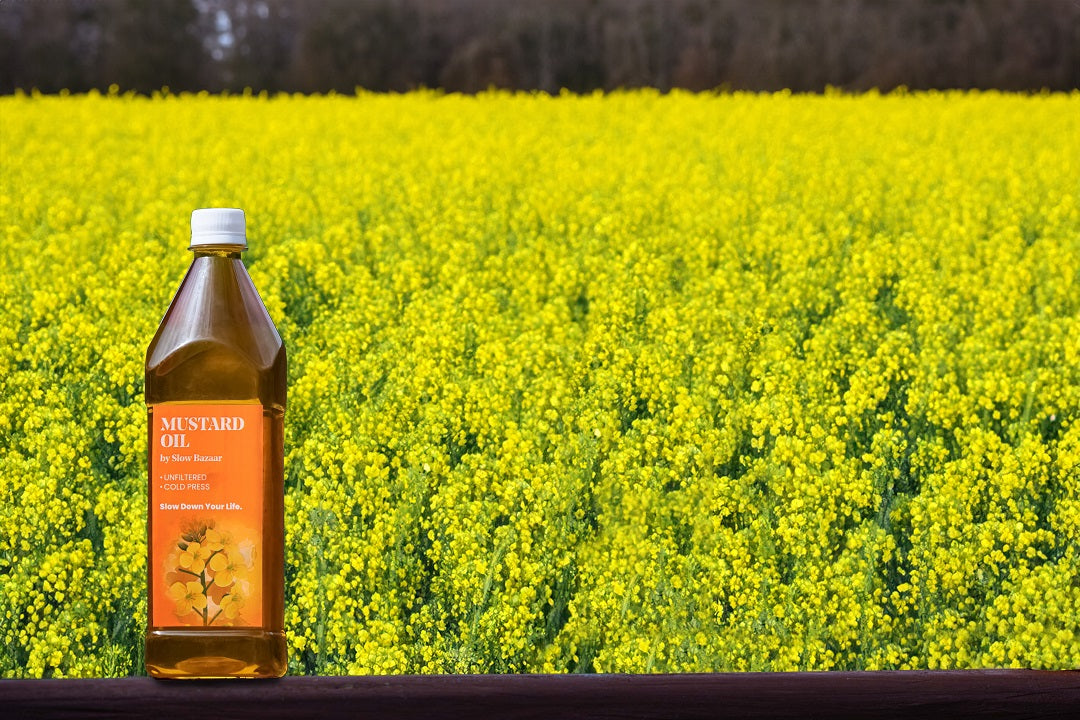It was a rainy Sunday morning when a pungent strong smell entered my room and I had to close my Twelfth Night which was anyway a tedious one to go through. I suspiciously tiptoed into the kitchen where Aai, my mother, was busy adding freshly chopped garlic and chillies to a dark golden oil in the kadhai that splattered. She later added fresh Fenugreek leaves to it.
Why would she use an oil that was so smelly? I thought to myself. The oil bottle read- Kachchi Ghani Sarson ka Tel. Some fancy words in advertising campaigns -- like "Refined Oil" drew my attention. I asked her why did we switch our oil? The previous one was so elegant, almost transparent, refined, without any smell. I loved it.
Aai, as she began chopping some carrots, narrated me a story that stayed with me!
My great grandmother had a wooden device, Kolhu or Kachi Ghani as they call it.
With a lot of effort, she and the neighbouring women would extract oil from mustard seeds, groundnuts and coconut too.
The oils were extracted in this wooden device without any chemical or any external heat applied. That was one of the purest forms of oil. She used it in gravies, in cooking veggies and oiled and massaged the newborns in the neighbourhood. Sarson or mustard oil would be used in winters and coconut oil for summer.
As I listened to my mother’s journey into the past, I noticed her pigtail, long and thick coiled like a snake and tied into a bun, whereas I have already begun losing my hair. Her grandmother always oiled her hair with this coconut oil. They never used any shampoo or conditioner or any hair serum.
Aai recalled the days when her grandmother used to boil the hibiscus flowers in coconut oil and it gave their hair a perfect nourishment that one could think of.
The oils nourished and protected the heart too.
Aai never recalls any of her elders having a heart-attack.
Yes, the process to extract these oils was tedious, not an easy one, but easy never bears any fruit, she says.
Nobody knew the concept of refining oils. They were dependent on things that were grown locally and used locally.
Aai mentioned that when I was born, my great grandmother massaged me with pure cow ghee for the first ten months.
As I dived into this world of homemade oils, I read that this method of extracting oils originated in the Indus Valley Civilization. Archaeologists found an oil extracting device in one of the excavations. They discovered frying pans that were quite similar to those used today.
Tapping on the science and nutrition side of these oils, research says that when oils are refined and heat is applied to them, they lose their natural nutrients and flavours. Why would I use something that is utterly useless to my body, I wondered!
Cold Pressed Oils on the other hand are low in their acidic values, retaining all the nutrients and flavours that they are supposed to have.
I kept wondering, what was it that made many of us switch to these refined, unhealthy oils? Was it globalization? Was it a fad to adapt to western culture and traditions? Or did we just fall prey to the world of advertisements that endorsed how good these refined oils were? Why did we not take a moment before discarding an ancient practice that dates back to the Harappan civilization?
Why did we forget that our body draws its nourishment from the things that are grown locally? The vegetables, oils, and food grains that are grown locally are going to nourish me more than the imported ones.
South Indians use coconut oil in most of their food preparations because they need to fight off the heat. North Indians on the contrary need to fight off the cold weathers and hence choose mustard oil in most of their food preparations.
We are a part of an ecosystem. We cannot pull ourselves out of it and adapt to health practices that may not suit our environment.
By the time my Aai brought me back from this incredible journey, I had already decided to go back to my roots. I am not going to quit a civilization, as ancient as time, that has given me incredible health benefits. So when are you going to know your roots and go back to basics?



Leave a comment